Amid mass destruction of generations of Palestinians and their cultural heritage, Chef Fadi Kattan’s latest book uplifts every season of Palestinian life and resists cultural erasure.
Bethlehem: A Celebration of Palestinian Food, by Fadi Kattan
Hardie Grant Books 2024
ISBN 9781958417287
Mischa Geracoulis
Published at a pivotal moment in the history of the Holy Land, the greater Middle East and Southwest Asia, global non-west and western empire, chef, restauranteur, author, and educator, Fadi Kattan’s Bethlehem, A Celebration of Palestinian Food is at once a sumptuous cookbook of Palestinian fare, an invaluable contribution to Palestinian cultural heritage, and an ode to family legacy.
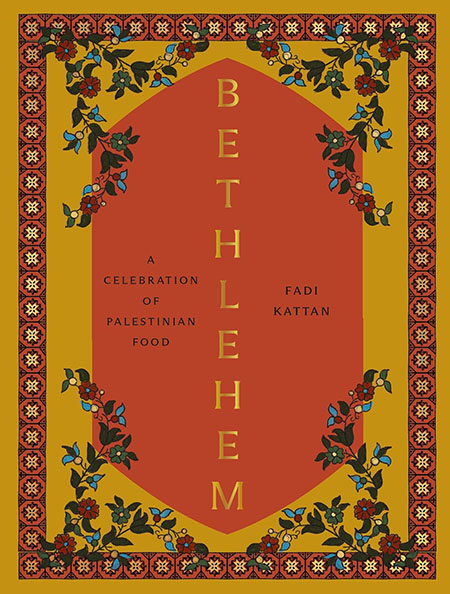
Bethlehem can easily be read cover-to-cover. Filled with pages of stunning photographs showcasing delectable dishes, elegant tables, and picturesque scenes in and around Bethlehem, the book works as something of an educational travelogue, as well. Sectioned by seasons, Kattan narrates a trip down memory lane, replete with regional and historical details. Each recipe and ingredient recounts personal and familial memories, imparts intriguing facts, and conjures a range of emotions.
For those familiar with Palestinian or Levantine fare, those emotions are likely to be heartwarming. For those new to the cuisine, feelings of anticipation to try out the recipes or empathy for the Palestinian struggle may be evoked, and for vegans or anyone leery of eating animal parts, the head-to-tail cooking exhibited in recipes such as Lamb Testicles with Spicy Tahinia, and Musakhan-inspired Chicken Liver Pâté, or the details of the inner workings of Bethlehem’s Natsheh family butchery might elicit shock.
Spring
Beginning at breakfast in springtime, readers are invited into the Kattan family home and treated to an array of ceramic artisan plates adorned with varieties of olives and fruit, jams, dips, cheeses, breads, halawa, and more. These recipes are as abundant in herbs as is the West Bank itself. Za’atar, the ancient herbal blend of ground and dried oregano, thyme, marjoram, sumac, and toasted sesame seeds, most identified with Middle Eastern and Eastern Mediterranean cooking, is mentioned in the first paragraphs of the chapter.
Za’atar can also refer to the single herb scientifically termed, “Origanum Syriacum.” Known in English as Syrian oregano or wild thyme, za’atar is a foraging herb native to the Levant, and Palestine in particular. However, in 1977, the Israeli government banned Palestinians from picking za’atar, falsely claiming it a protected species. Palestinian foragers found in possession of za’atar can be fined and/or imprisoned for up to three years. In a 2021 podcast episode of This is Palestine, human rights attorney Rabea Eghbariah termed the criminalization of foraging herbs as “un-fooding.” In other words, the government treats these native, edible herbs traditional to the Palestinian diet not as food, but as illegal contraband. Eghbariah posits that “un-fooding” is a tactic to alienate Palestinians from their land.
Visualizing Palestine, a multidisciplinary research and data organization that illustrates data through infographics, reports that Israeli bans on Palestinian agricultural use endangers Palestinian food sovereignty, “the right of peoples to healthy and culturally appropriate food produced through ecologically sound and sustainable methods, and their right to define their own food and agriculture systems.” Food sovereignty is both an environmental justice and human rights issue, contends Visualizing Palestine. Seen through the lens of colonial-settler apartheid, Visualizing Palestine argues that Israel’s denial of Palestinians to forage wild herbs and produce their own food, violates the principles of food sovereignty.
Of Bethlehem’s 70 recipes, seven call for za’atar. While Kattan doesn’t get into the specifics of food bans, his pages on Jericho mention the impact that colonialism [via military occupation] has on Palestinian agriculture due to Israel-imposed restrictions on Palestinian use of land, water, and the foraging of wild plants.
As it turns out, za’atar is not the only foraging herb restricted to Palestinians. Others include miramiyyeh (a variety of sage infused as tea) and akub (Gundelia tournefortii), a type of thistle native to the Middle East and Southwest Asia. Akub is such a mainstay of Palestinian life that Chef Kattan’s London restaurant is named for it. Akub’s menu, which specializes in healthy, cultural, Palestinian-defined food may be seen as an assertion of the right to food sovereignty.
Summer
Summer’s recipes are resplendent with fruit local to Bethlehem and the surrounding area. Starting with a recipe for baklawa made with Mistakawi apricots, this chapter showcases the bounty of the West Bank — tomatoes, figs, okra, eggplant from Battir, the iconic watermelon, and Jaffa oranges that are inseparable in Kattan’s mind from his Teta Emily, the paternal grandmother he never knew. In somewhat melancholic nostalgia, he describes the oranges as intrinsic to Palestinian history and heritage, as well as his family’s loss of their precious groves in the 1948 Nakba. Jaffa oranges, like the watermelons of Jenin, are symbolic of Palestinian identity, memorialized by Palestinian journalist and poet, Ghassan Kanafani, in The Land of Sad Oranges (1962).
Autumn
Autumn’s arrival brings the olive harvest, a crop essential to Palestinian cuisine and to the livelihood of many. Since 1967, the Israeli government has uprooted or razed upwards of one million Palestinian olive trees. Since October 7, 2023, settler vandalization of Palestinian olive groves has escalated, most notably at harvest time to inflict maximal destruction. The Food and Agriculture Organization of the United Nations’ Food Systems Profile on Palestine (2023) reported that one of the primary “factors contribut[ing] to the challenge of chronic food insecurity and malnutrition in the Occupied Palestinian Territory, [is] the Israeli occupation and the blockade of the Gaza Strip.”
Perhaps despite or because of its persecution, the olive tree epitomizes Palestinian resistance and connection to the land. Ramzy Baroud and Romana Rubeo have said that for any resistance to be sustainable, it must be rooted in culture. What could be more rooted in culture than the olives of Palestine? As Kattan’s recipe for Pickled Palestinian Olives resolutely attests, olives are sustainable and a staple at every Palestinian meal.
The Autumn chapter also features the chef’s mother’s recipe for lentil soup and his grandmother’s recipe for safarjal, or quince jam. Other warm seasonal specialties include Cauliflower Makloubeh, the storied upside-down rice dish, and salad made with freekeh, a grain essential to the Palestinian diet for some 2,000 years.
Winter
Much of the Winter section is devoted to Christmas and was for me particularly bittersweet to read during Israel’s ongoing bombardment. Bethlehem, hometown to Chef Kattan, birthplace of the biblical Jesus and the reason for Christmas itself, saw no celebrations in 2023. As reported in TMR, owing to Israel’s war, the sacredness of Christmas was not held in celebration but in solemnity and solidarity with Gaza.
On Christmas Eve 2023, program manager of Catholic Relief Services, Ola Musleh, wrote, “Across the West Bank, we, as Palestinians feel alone as the world watches our brothers and sisters in Gaza face unimaginable suffering. Usually a time when Palestinians, Christian and Muslim, celebrate the birth of Jesus with tourists from all over the world, today we feel like the world is no longer with us…As a Palestinian Christian, canceling Christmas celebrations this year feels right. We can’t celebrate while Palestinians in Gaza face so much suffering.”
The section titled Christmas Eve with Teta Julia relays the chef’s grandmother’s love for Christmas and for Bethlehem and her teachings on the importance of solidarity, hospitality, generosity, and resilience. Teta Julia’s Christmas Cake recipe is not only a tribute to the beloved grandmother who set Kattan’s culinary passion and subsequent career in motion, but a testimony to the values she instilled.
In his December 2023 newsletter Kattan wrote, “Amid [ongoing] chaos and strife, Bethlehem: A Celebration of Palestinian Food is a testament to resilience and community with stories and recipes that provide a glimpse into the enduring legacy of Bethlehem.” He expressed his hope that “our people and friends across the world persevere to share and celebrate the beauty of our culture, hospitality, cuisine and life, that tell the story of Palestine through every song, book, poem, dish, film that they create.”
Kattan described what the United Nations Educational, Scientific, and Cultural Organization (UNESCO) deems “intangible culture,” and according to UNESCO’s purpose and mission, cultural heritage warrants protection and restoration. Sharing and celebrating Palestinian culture by way of his recipes contributes to UNESCO’s mission, the import of which is both global and local.
If writing, as Mahmoud Darwish expressed, is an act of memory against history’s fast forgetting, an act of resistance and refusal to be forgotten, Kattan’s act of putting treasured recipes and multigenerational culinary traditions to paper makes Bethlehem more than a cultural cookbook. It is a show of resilience, an act of resistance, and a bookmark in the historical record. His heirloom recipes exhibit the prowess of a celebrated chef and pay tribute to the Palestinian palate. His storytelling and devotion to his heritage, family and friends champion the best of humanity. Bethlehem: A Celebration of Palestinian Food makes a prized addition to the collections of professional and novice chefs alike, and helps to safeguard Palestinian cultural heritage and ensure that the sacred city of Bethlehem prevails.



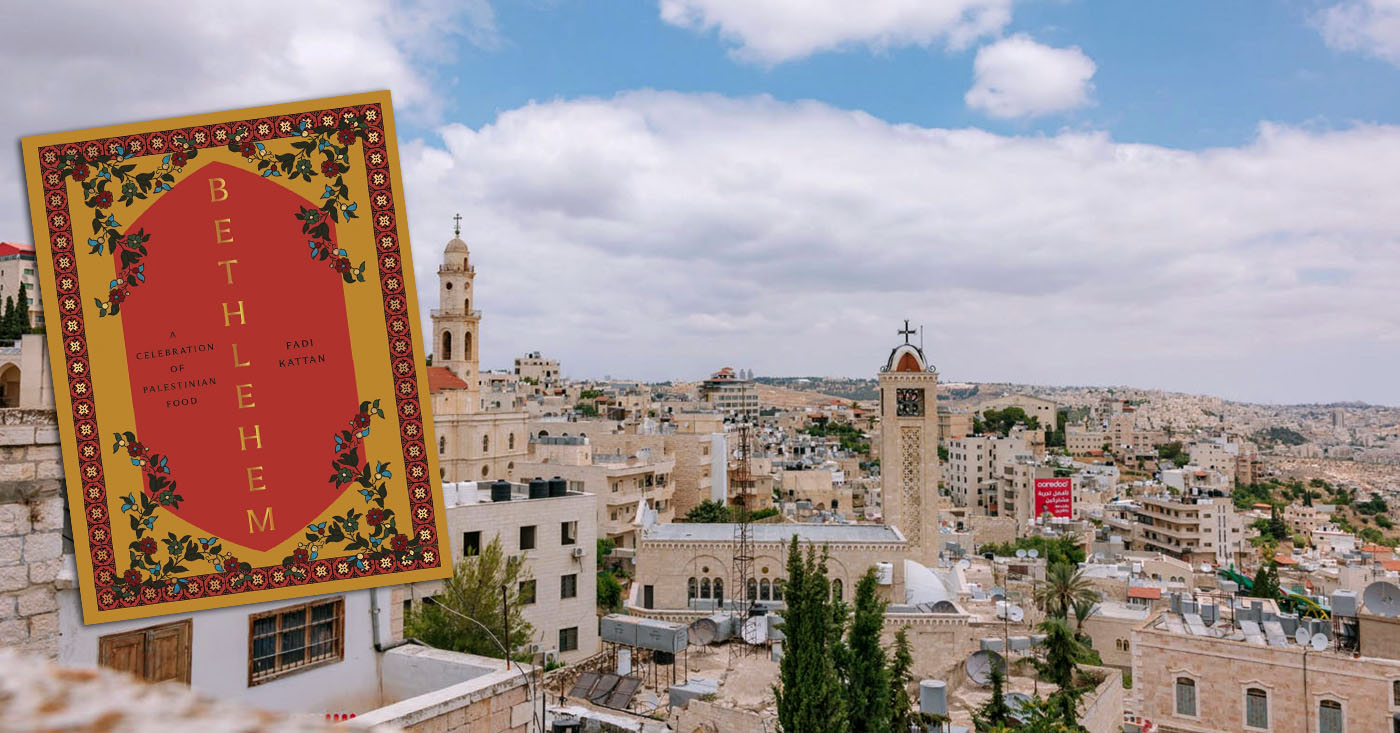


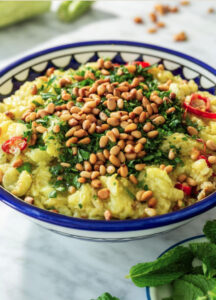
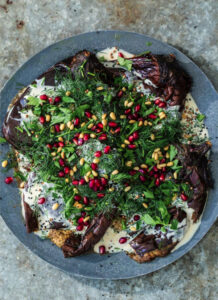



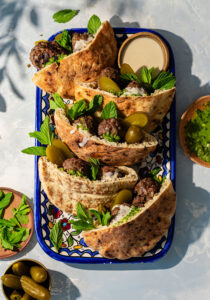
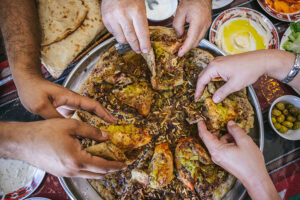
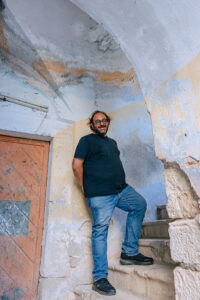









































































![Fady Joudah’s <em>[…]</em> Dares Us to Listen to Palestinian Words—and Silences](https://themarkaz.org/wp-content/uploads/2024/03/SAMAH-SHIHADI-DAIR-AL-QASSI-charcoal-on-paper-100x60-cm-2023-courtesy-Tabari-Artspace-300x180.jpg)



































































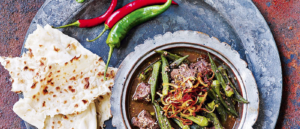



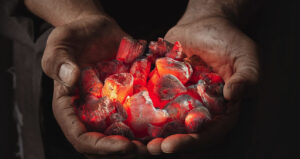





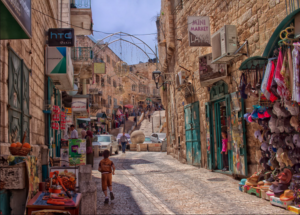







Thank you for writing and publishing this beautifully-written review. I had no idea that za’atar was restricted to Palestinians in the West Bank… Can’t name a single Palestinian person in the diaspora who didn’t grow up eating za’atar and olive oil rolled up in pita pockets. Way to turn an act as simple as eating za’atar into an act of resistance – our entire being and sheer existence is an act of resistance)…